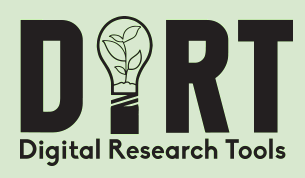UPDATE: Since I posted this BambooDIRT has been updated with a new website and logo. Same functionality and top notch curating, however.
There are a huge number of digital tools for digital humanists to sink their teeth into (see for example my post on "Digital Humanities research resources you should know about"). It is unfortunate that--and I am sure I am not alone in this--it is often only through serendipity that you come across them.
Sometimes, sadly, serendipity is rather slow working and slightly slap-dash in her delivery. That is why I am rather excited to have bumped into the Bamboo DiRT site. The site describes itself as a "registry of digital research tools for scholarly use" and it certainly include a large number of excellent digital tools for humanities scholars to take advantage of.
What I particularly like is the fact that it appears to be very well curated. By doing this they have created a nice way of separating the wheat from the chaff making it much easier for scholars new to the digital humanities and the plethora of tools available to them to get started.
You're greeted with an well managed list of things that you may want a digital tool for in the humanities such as:
- Writing (Author an interactive work, Blog, Publish and share information, Write a paper, Write collaboratively)
- Data Analysis (Analyze data, Analyze texts, Search visually,Collect data, Conduct linguistic research, Visualize data, Make a dynamic map)
- Professional Networking (Network with other researchers, Blog, Publish and share information, Share bookmarks, Communicate with colleagues, Stay current with research, Create a mashup)
- Transcriptions from hand written or oral sources (Transcribe handwritten or spoken texts)
- Workflow tools (Manage bibliographic information, Manage tasks, Organize research materials, Build and share collections, Collect data, Stay current with research, Take notes/annotate resources, Convert/manipulate files, Use an iPad, Edit images, Find research materials, Make a screencast, Brainstorm/generate ideas).
Several of the tools I have come across previously and use regularly, such as the concordance program AntConc. The most important for me is Zotero which is such a core part of my research workflow I can't imagine working without it. Do take a look, however, to see whether it lists anything that may help your research and--obviously--if you use something yourself not included give the editors/curators a message so they can update their list.
What digital tools do you use in your research and what do you use them for? I'd love to find out more about what people utilise to get the most out of their research and material.

No comments:
Post a Comment